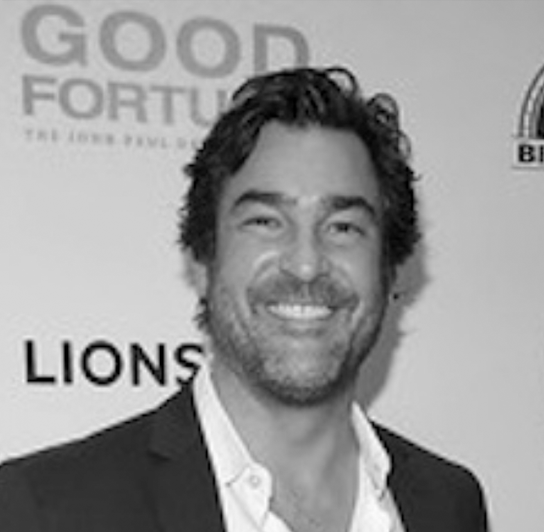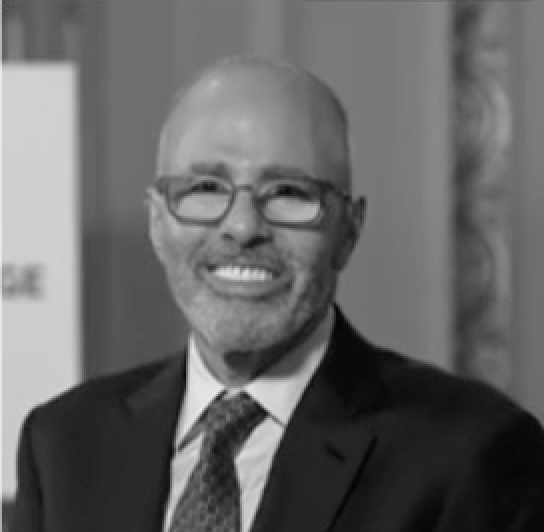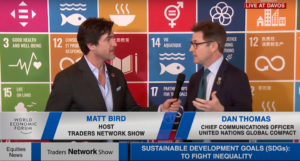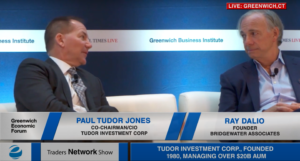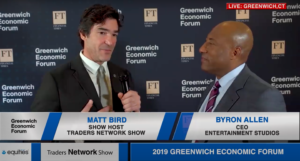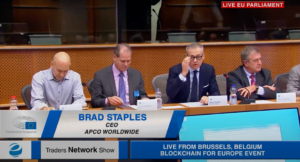Matthew Sanders, Sarah Spiekermann-Hoff, Steve Fuller, Tyler Vanderweele, John Havens, Ezra Sullivan, and John Murdock Deliver Maximizing Human Flourishing Panel at Humanity 2.0 | Traders Network Show – Vatican City
Contributed by: Show Editorial Team
Matthew Sanders, Sarah Spiekermann-Hoff, Steve Fuller, Tyler Vanderweele, John Havens, Ezra Sullivan, and John Murdock deliver Maximizing Human Flourishing panel at Humanity 2.0 (Vatican City)
HIGHLIGHTS
- Global wealth grew during the past year by 2.6% to $360 trillion
- Vatican manages 26% of healthcare facilities globally
- By 2021, 80% of emerging tech will have AI foundations
FULL COVERAGE
INTERVIEW TRANSCRIPTS: Matthew Sanders, CEO of Humanity 2.0, Prof. Sarah Spiekermann-Hoff, Head of Institute Management Information Systems at Vienna University of Economics & Business, Prof. Steve Fuller, Chair in Social Epistemology at University of Warwick, Prof. Tyler Vanderweele, Director of Human Flourishing Program at Harvard’s Institute for Quantitative Social Sciences, John Havens, Executive Director of IEEE Global Initiative on Ethics of Autonomous & Intelligent Systems at IEEE, Fr. Ezra Sullivan, Director of Project Vision at Humanity 2.0, and John Murdock, President of Bandwidth Inc.
Matthew Sanders – CEO, Humanity 2.0: 00:00
The purpose of this panel is to kind of bring people from different fields. I’m going to introduce them all to kind of discuss some of the insights that father Ezra had and to share some of their own. So let me just briefly go through on a read all their titles outs. I don’t mess them up. So you already met father Ezra Sullivan. I’m Matthew, the CEO of the foundation. Professor Tyler is directly to my right. Professor Tyler is the director of the human flourishing program at Harvard’s Institute for quantitative social science. It’s an awesome title by the way.And then we have a professor, Steve, you’re next on the list. So I’m going to go with you. Professor Steve Fuller is the chair of in social epistemology at the University of Warwick. And also you should read his book. It’s called Humanity 2.0 it’s got all, it’s got a wicked title. He’s kind of like the, you kind of like the godfather of that whole concept in some ways. And then we have John havens. John raise your hand. John havens, the executive director of the IEEE global initiative on ethics of autonomous and intelligent systems. Very interesting guy, very interesting work and we’re delighted to be working with them at Humanity 2.0. Professor Sarah Spiekermann-Hoff is the head of Institute for management information systems at the University of Vienna. Did I get that all right, professor? I’m sorry. Okay. There you go. Go on. Do you want to straighten the record?
Prof. Sarah Spiekermann-Hoff – Head of Institute for Information Management Systems, University of Vienna: 01:18
Yeah, it’s Vienna University of economics and business and my Institute is also called information systems and society.
Matthew Sanders – CEO, Humanity 2.0: 01:30
Ah, thank you. Thank you for setting me straight. And finally, last but not least, John Murdock, who’s the president of Bandwidth incorporated. So as opposed to me going straight to our questions which I gave to you, I just want to say based on what you guys heard, is anyone have any initial reactions in the first person speak gets the, start us off. There we go, Professor Steve Fuller here we go.
Prof. Steve Fuller – Chair in Social Epistemology, University of Warwick: 01:55
You want me just to respond to what he said as opposed to more general.
Matthew Sanders – CEO, Humanity 2.0: 01:59
Yeah. And then you can feel free to weave in your own thoughts.
Prof. Steve Fuller – Chair in Social Epistemology, University of Warwick: 02:01
Okay. The first thing I would say is I think in one of the reasons why I wrote this book, Humanity 2.0 is because I think humanity is itself a contested concept. So there’s a sense in which there’s a lot to play for here and there are a lot of assumptions you might say being made in this. But I thought one thing that was very interesting in father Ezra’s presentation was this claim that we can somehow detach this conception of the human that he’s presenting from politics and religion. And I’m not sure that’s the case. So of course one doesn’t want to go around crediting and blaming particular religions or ideologies or so forth. I would say to use your example of the countries that have the highest global sustainability rates, the highest wealth, yet the highest suicide levels is these are countries that all have a history of having fallen away from Christianity through Protestantism.
Prof. Steve Fuller – Chair in Social Epistemology, University of Warwick: 02:58
To be largely aethestic. No, I mean, you know, I do think that’s kind of an issue. And I do, you know, and I just say that as a matter of fact, right? And also a certain understanding of global sustainability, especially if one has a really strongly ecological ethic, would not want to maximize the presence of human beings on the planet. So you can imagine people living quite healthy, wealthy lives for a certain period of time and then at a certain point saying it’s time to check out and that’s in fact in the best interest of the planet. Okay. So now that’s tied to, again, certain kinds of politics regarding this kind of thing. And I think if one doesn’t start talking about those kinds of issues explicitly, then we don’t really see the obstacles as it worked to the kind of vision you’re trying to present because there are some real obstacles and they have to do with the contested notion of the human.
Prof. Steve Fuller – Chair in Social Epistemology, University of Warwick: 03:54
Can I say a couple of more things? Do you want me to back off at this point? Okay. I think there’s a lot of love in a certain way for the concept of humanity. The problem is with as much love for people. Okay. and I’m really struck, for example, you may know last month there was the great fire at Notre Dame cathedral in Paris. Okay. In 24 hours, $900 million was raised to rebuild that thing. Okay. Now that made me think at the time about the live aid conference in 1985 you remember the rock concert that took place both in Britain and America for Ethiopian famine relief? Adjusted to inflation that raised $300 million. Okay. So in today’s dollars, so that’s 1/3. Okay. Now that gives you a sense of, in a sense spontaneously how people respond to humanity it seems to me.
Prof. Steve Fuller – Chair in Social Epistemology, University of Warwick: 04:53
What exactly they are willing to spontaneously put their money on. Okay. And I do think so that’s one obstacle there, right? That it’s, it’s actually quite difficult to get a sense of the sense in which people are committed to the concept of the human. And, and I would say that there are a couple of other things on the horizon as well that one needs to pay attention to. And you actually alluded to it a little bit when you were talking about the animals and the toys because I’m insofar as we have movements that are being supported by some of the most educated people in the world for animal rights and on the other hand for Android rights. Okay. And to incorporate these as part of our ordinary legal system and a lot of effort is being made to do this even though we’ve barely got human rights off the ground.
Prof. Steve Fuller – Chair in Social Epistemology, University of Warwick: 05:42
Right? I mean these are all simultaneously happening. And so there is a certain sense then in, you know, you might say that our, our concept of humanity, cause I see all of these moves to extend animal rights and to extend to Android rights. And of course the whole idea of cyborgs where humans turn into machine like creatures, right? So we haven’t talked about that one yet. But there’s that intermediate stage as well that the fact that all of these things are moving along simultaneously means that our concept of humanity is subject to a kind of uneven development, right? Where we’re in one sense quite willing to leave behind quite a lot of the population at least spontaneously, unless there are efforts like the efforts of the Catholic church to proactively remind us of all these issues. They’re bound to be left behind in the long-term as we move forward to the next phase of the Humanity 2.0 the kind of trans humanity and stuff of that kind. And so it seems to me that’s the real challenge here, right? That we have a concept of humanity that is subject to a kind of uneven development with, you know, a lot of the population still being left behind without their human rights as we plow ahead into machine rights and animal rights and cyborg rights and all the rest of it. So I’ll stop there.
Prof. Sarah Spiekermann-Hoff – Head of Institute for Information Management Systems, University of Vienna: 07:03
Thank you so much. I couldn’t share more of an opinion with you and I would like to take not your Notre Dame because it shows something. We are spiritual beings that see that there is something that is greater than us and when people start crying just because a church goes down, this is interesting isn’t it? And the argument that I want to make is that the worst thing we can do and the step we need to go, if we really want to talk about Humanity 2.0 which I think is a strange name, but if there is a step in we need to take it is to go away from the term human resources because resources is something that we can measure that we can count, that we can do statistics on. And this morning I have seen your only so many statistics and counting. Like Peter Drucker said, what you can’t count, you can’t manage. And this is when we go to Humanity 2.0 we need to replace this term of resource with being.
Prof. Sarah Spiekermann-Hoff – Head of Institute for Information Management Systems, University of Vienna: 08:24
We shouldn’t talk about human resources. We should be talking about human beings. And the practical contribution I did is when I work with IEEE, the largest engineering organization on earth was 420,000 members we’re developing standard and how to build into system engineering processes of focus on human beings. And you know what, when I wrote the first draft, I talked about users, I didn’t talk about beings and at some point I realized no, it shouldn’t be like that. And I took the application that exchanged the user with the human being and start with the business school is if you are teaching in Harvard and in Warwick, get rid of the HR.
John Havens – Executive Director of IEEE Global Initiative on Ethics of Autonomous & Intelligent Systems, IEEE: 09:21
Just to build on to that if that’s okay. Another word I hate is the word consumer. Hate that word. Cause it defines a person only in the model of purchase versus purpose. And thank you for your talk. I also want to mention before I forget a couple of women whose work I greatly admire, which I think would be helpful to Humanity 2.0. One is a woman named Brian Eisler. She wrote a book called the S the cross that was a city cross and the switchblade, but that’s David Wilkerson. But her work focuses a great deal, she works at a place called the center for partnership studies on a key reason that women and kids aren’t paid attention to, which is the GDP. This is the greatest metric that is still currently used to measure big air quote “Prosperity”.
John Havens – Executive Director of IEEE Global Initiative on Ethics of Autonomous & Intelligent Systems, IEEE: 10:11
Prosperity does not measure caregiving and when you don’t measure caregiving, when you realize that it’s women that around the planet, this is not a sexist thing, it’s just fact in terms of who in homes per capita raises kids is women. I’m not good at math, but the transitive theory says if GDP doesn’t measure caregiving and mostly the caregiving is women, then the GDP doesn’t measure say it with me women. And that’s why I think there’s a glass ceiling is not because people don’t realize that women can do the same work as men. I mean that’s unfortunate if you’re sexist in that way, obviously. But is that the actual metric that still measures human productivity is, that’s the main thing. If you understand GDP, it, it’s a backward facing metric to measure largely productivity and exponential growth. It’s not evil. It’s just very, very finite and that’s why I really appreciate your talk in terms of flourishing is a much broader scale to focus on.
John Havens – Executive Director of IEEE Global Initiative on Ethics of Autonomous & Intelligent Systems, IEEE: 11:10
Then the other thing I was going to say another great book to read if you haven’t read it, is called “If women counted” by Maryland Werrin, she’s the person who I first discovered this from. If you actually dig into the GDP, and I bring this up because if we don’t measure, and I know that happiness index, certainly the suicide thing, I didn’t realize that that’s a big concern, but I’ve done a lot of stuff with the OECD better life index. Sarah knows and introduced me to Jeffrey Sachs who does a lot of work with the SDGs. The main thing you’ll always be thinking about in these questions of flourishing is how do we avoid a sort of myopic focus on just one thing is to understand that humans, at least right now we’re very multidimensional and especially the last point I’ll make is in the work we’ve been doing with IEEE it’s been really helpful to me as a westerner to get to have, we have a lot of members from China and South Korea and Japan to understand there is a, we found from an ethical tradition, there’s a bonding of what’s called virtue ethics, which in the West is a Greek idea, but also in areas of Confucianism and Buddhism.
John Havens – Executive Director of IEEE Global Initiative on Ethics of Autonomous & Intelligent Systems, IEEE: 12:18
And then in the global South Ubuntu ethics, there’s this wonderful opportunity which really boils back to a woman who was on a previous panel kind of about kindness and the golden rule, which is pretty standard in a lot of cultures. But I bring all this up to say that flourishing, if you can think about both individual and societal and in the technology side of what we do, to your point earlier, father was not to you know, technology is neither good nor evil, but it’s also not inert. It just kind of shows up in your life. And so our goal with IEEE, we have this big book called Ethically Aligned Design. It’s free, sorry to pitch, but it’s free. So it’s not really a pitch. And three years, 500 people have worked on it globally to try to ask a lot of these questions to save time from for academics and industry folks to have to do on your own with solid recommendations. It’s not just principles, it’s recommendations about what to avoid. And we actually have an entire chapter on wellbeing or the Greek word eudaimonia or flourishing, focusing on the economic side of things, Maslow, and then actually how you have to build things in that way. The very last thing I’ll say, at least for this comment is I’m also looking for a job at Patagonia. It’s a great place. He’s not the room anymore. Okay. That’s for you. All right. I’ll talk to you later. I’ll pitch you later.
John Murdock – President, Bandwidth: 13:39
So I’m just a businessman. But I think in terms of being a business leader and the most important thing that maybe I can contribute here is everyone dressed up here. Everyone with what you do in your everyday activities is you show up in a workplace and human flourishing in the workplace is extraordinarily important. We’re a public company. I had the privilege as a technologist taking a company public and leading it successfully as a public company. Patagonia’s private. What Rick spoke to was really interesting. I’ve never met Rick not to give Patagonia another plug, but we’re modeling a child development center that we’re actually building from Patagonia and it works for public companies and you can succeed in a competitive work environment and makes bottom line sense. But the most important thing is people are purpose driven and they want meaningful work lives.
John Murdock – President, Bandwidth: 14:41
We don’t have HR. We have a chief people officer. So based on your comments, they’re not a resource. They are people. They’re something so much more than something to extract from. Father Ezra, thank you for your contribution. First of all, probably the most important thing I can say about father Ezra and will give me more credible credibility with all of you here is I knew him as a much younger priest, although he’s still very young. Since he came from California, he’s gotten much better and I’m the founding member of his official fan club. His presentation from the business perspective or the deliverables perspective where the rubber hits the road and human flourishing is extraordinary in that it takes us from the abstract and it takes us from a lot of confusing terminology and it brings us a framework and a priority.
John Murdock – President, Bandwidth: 15:38
And I want to emphasize the indicators part of that because I start thinking of actionable, I start thinking of responsibility and I start thinking of deliverables. So built around his indicators. You can have key performance indicators, KPIs, you can have MPO’s you can start having accountability and responsibility. I think it’s extraordinary because that’s the first time I’ve ever seen any effort that develops some type of framework of something so broad a topic, let the debates begin with what human flourishing as we’ve heard so passionately here, find a common ground, but actually start having deliverables and having metrics built around that. So I wanted to give a plug to father Ezra. Thank you for your contribution.
Matthew Sanders – CEO, Humanity 2.0: 16:29
Professor Tyler, why don’t you tell us a little bit what you’re doing at Harvard and human flourishing program.
Prof. Tyler Vanderweele – Director of Human Flourishing Program, Harvard’s Institute for Quantitative Social Sciences: 16:30
So one of the questions the panel was asked to address was what are some of the major impediments to human flourishing? And my response to this I think relates quite closely to father Ezra’s presentation. My view would be that one of the major impediments is not pursuing as a global society, a sufficiently broad set of ends and measuring and tracking those. We have, as we saw in father Ezra’s presentation, in fact, made considerable progress on health and economic development even perhaps on happiness. And if we look at the progress over the last 200 years, it is astounding and we have quite a bit of way to go still as we heard earlier this morning. And not all that progress has been equally distributed, but we’ve made major progress in these domains of human life. But what is missing from these? I think the more human and existential dimensions of flourishing things like meaning and purpose, like character, like close social relationships and these, I think we have not in fact seen comparable progress.
Prof. Tyler Vanderweele – Director of Human Flourishing Program, Harvard’s Institute for Quantitative Social Sciences: 17:38
If anything, the limited data that we have on these measures suggest that in the developed world these are declining. And I think it is that fact that explains paradoxical relationship between development and suicide, the lack of meaning, the lack of purpose, the declines in character and relationships. And I think some of the problem is that we are measuring an incomplete set of things. I do think we should pursue economic growth. I do think we should pursue health and happiness, but we also need to likewise pursue some of these other ends as well. We had question as to how do we assess human flourishing? What is human flourishing? And this is certainly a contested area. What we’ve tried to do at the human flourishing program at Harvard is ask what is common to seemingly all notions of human flourishing? And we identified a number of domains, happiness and life satisfaction, physical and mental health meaning and purpose, character and virtue and close social relationships.
Prof. Tyler Vanderweele – Director of Human Flourishing Program, Harvard’s Institute for Quantitative Social Sciences: 18:43
The argument is not that this exhausts what human flourishing is, but that and whatever else it might include, it would include these five domains as well. So we have developed a brief measure of human flourishing with two questions in each of these five domains drawn from the existing wellbeing literature and also access to questions on financial and material stability as means to help support these other ends. And we think each of the five domains of human life are nearly universally desired and constitute ends and of themselves. And those criteria might help shape some consensus on what to measure. We’ve collected data on this measure and a number of workplace settings in schools, in cities, and we are trying to launch now in collaboration with Gallop, a worldwide wellbeing study, measuring these domains and among the 300,000 individuals and 22 countries, geographically and religiously diverse covering 70% of the world’s population, which will be nationally representative in the same individuals we’ll be following over time.
Prof. Tyler Vanderweele – Director of Human Flourishing Program, Harvard’s Institute for Quantitative Social Sciences: 19:51
We hope that a study like this will help us understand what the major determinants of flourishing are, including in these more nebulous domains like meaning and purpose, character and relationships. We are still looking for partners in this work to try to help support this somewhat costly study and make this a reality. But we hope that by collecting these data, we can help pursue this broader set of ends for humanity. I think to neglect things like character, like meaning and purpose like relationships is in fact to let down humanity. We need to pursue a broader set of universally desired ends. Thank you.
Prof. Sarah Spiekermann-Hoff – Head of Institute for Information Management Systems, University of Vienna: 20:29
I do see a dilemma though. Because if you talk about character and you go back to Aristotle and Nicomachean ethics and you talk about what is character courage for or generosity how are you going to measure this? What questions are you going to ask? I headed a business intelligence for a while for a Silicon Valley startup. I know that data are prostitutes. Questionnaires. They don’t get you far. I don’t want to say I buy into your message to say, of course there are indicators we need to have that go beyond GDP. I couldn’t agree more, but I think it’s very, I don’t get me wrong, but naive to think that we can simply develop these global indicators and measure them through thousands of questionnaires and then our elites keep staring into a digital mirror instead of going into reality. I think, and the church could be a part in this. What is really important is to talk to the people, to have communities and focus groups and to develop a qualitative understanding of reality. To talk to taxi drivers and to go to the slums and to go to the universities and to understand what’s really happening and don’t completely 100% follow this digital mirror measurement illusion. It’s an illusion of the truth and what keeps elites away from it’s what is really happening on the ground.
Rev. Ezra Sullivan – Director of Project Vision, Humanity 2.0: 22:29
I think you have a very important message and part of the question is whether indicators can be reduced to a quantitative measure and whether they can be an indicator that has other kinds of data points. So Seligman and Peterson worked on this very question and they published a work in Oxford. It’s about character strengths. And one of the things that they did was they built on the Aristotelian insight, namely that when we’re trying to look at what is human flourishing, it’s just as helpful to look at an individual who’s similar to us and to have that example as a person to whom we look as a way to flourish ourselves. And so you can both have certain quantitative measures, self-reporting, for instance, you have qualitative measures. A courageous person is somebody who does something courageous in their context. And then you have, here’s what a courageous person looks like, and of course it’s going to be contextual as well. Now of course this is very controversial, but what’s interesting is that if you do a cross cultural sectional study of people they emulate as courageous and you start to abstract or bracket from things that would be contrary to courage or things that are confounding with other kinds of character strengths, then you can start to down and say, this kind of person is more universally recognized as courageous.
Rev. Ezra Sullivan – Director of Project Vision, Humanity 2.0: 23:46
It’s not an easy thing. And there’s going to be lots of controversy. Of course in the end as, as professor fuller said, my, my presentation was full of assumptions. That’s the whole idea is we have to say, we have to assume lots of things just to put something out. And then we try to refine those assumptions over time. And of course, once we find a base where we agree on those assumptions, we can start to build together.
John Havens – Executive Director of IEEE Global Initiative on Ethics of Autonomous & Intelligent Systems, IEEE: 24:29
So my, my last two books were actually about technology and wellbeing and I’ve written about indicators for like the last seven years. One thing, by the way, I’ve been in a lot of happiness panels and it always, this is not happening here, but it always cracks me up when big arguments break out in the happiness panel. Always. Like this seems ironic to me by any definition. And I’m really glad you mentioned economic wellbeing indicators. Those three words have 18 different definitions each. But there are, you know, the census data is normally considered quantitative data. Most people don’t say you unless you counted wrong. That is objective data that depending on if you’re looking at the genuine progress index or any number, the OECD better life index, Bhutanese gross national happiness, all of these things tend to have objective. The subjective a lot of times has done by surveys. One thing, MIT, we’re working with them on a project. There’s a new type of machine learning called probabilistic computing that’s actually helping with the actual gathering of the data. So that’s pretty cool. But one thing sort of at the end of the day is a sense of, and this is something Sarah talked about, which I think is critical, is the holistic aspect of who are you looking at and are you listening to everybody. A fantastic film, if you haven’t seen it, it was the most watched documentary on iTunes four years ago.
John Havens – Executive Director of IEEE Global Initiative on Ethics of Autonomous & Intelligent Systems, IEEE: 25:32
“Happy the Movie.” And when seeing that, Oh, you got to watch it, it starts off with one of the first scenes I always forget. It’s like a guy from logos or something and he has a Rick Shaw and he’s pulling the Rick Shaw through squalor what I would consider a squalor, not to judge, to judge, but he’s barefoot running through puddles and, and then they interview room and this, are you happy? He says, yeah, I’m really happy. And they show his family and there’s like 18 people all waving and stuff. He’s like, I have a wonderful family. And they show unfortunately a young guy from Japan, very wealthy. And I said, are you happy? And he says, I’m kind of miserable. And it’s this wonderful sense of, first of all, Maslow, and I won’t go too long into this because again this is where the panels go, but Maslow, no one that I know in the wellbeing space would ever say you have to take care of someone’s basic needs first. So water, health, safety, boom. But then what’s interesting to watch, especially as a Westerner watching this movie, if you get the chance to watch it, is the sense of why do we use another phrase that I hate? I hate the phrase “developing nations” versus “developed” and then you look at certain nations in terms of how they love each other. Well, how they treat themselves first and love each other, love themselves in the sense of trying to understand how character and family can help them and they are the developing, but yet in America we’re struggling with suicide and sometimes the term developed is used. We have the wrong lens and thank you for your help to change that.
Prof. Steve Fuller – Chair in Social Epistemology, University of Warwick: 26:43
Well first of all I want to say I don’t quite have the issues that you have about the quantitative versus qualitative thing. I think that’s just social science and essential always have to live with that issue. But I do think the issue about the assumptions of what we mean when we say meaning, purpose, character, all those kinds of things really do need to be unpacked. Okay. Because suppose we do have a large group of people and I think they’re growing in numbers who in fact relate more to animals than to other human beings and the sorts of kind of feelings and emotions and even bonds that they form, social bonds, are the kinds that in the past we would expect only to be done with other human beings. And indeed, they might even say they prefer animals to human beings. And it might be on moral grounds as far as they’re concerned, given what human beings have done to the planet, for example. Okay. Moreover, take the issue of suicide with regard to character. Does suicide indicate a strength of character or a weakness of character? Because of course in the Western tradition of course there is this very kind of strong view that in a sense, suicide is the ultimate act of freedom. That you take it freely in a clear state of mind. That’s the, the, the ideal context in which you do it. And that in a way epitomizes your humanity that you know when to stop. And so, there’s that issue as well.
Prof. Steve Fuller – Chair in Social Epistemology, University of Warwick: 28:14
And what about the people to go to the cyborg issue? People who feel that they are not complete unless they enhance themselves. So in other words, they take their biological bodies of birth as in a sense no more than platforms on which to build other things. Quite literally. Okay. And it seems to me that this is a very serious issue and people’s wellbeing gets very much tied up with this kind of matter. And I think, you know, in a sense, you’re going to have to take a line on that, right? Whether you, whether you recognize that as part of a kind of Maslowvian self-transcendence of the physical maybe, or do you take it as kind of pathology? Right. I mean, and so it seems to me that there going to be some hard value decisions that have to be made, but once you make those decisions, I think it can be measured.
Prof. Tyler Vanderweele – Director of Human Flourishing Program, Harvard’s Institute for Quantitative Social Sciences: 29:00
So I very much appreciate that there are differences across traditions and I think they’re important. I don’t think they should be ignored, but I would also maintain that we can find a lot more in common than we have. And I think especially once we move towards measurement, many of the sorts of items that we use, regardless of one’s philosophical or religious position, would be viewed as desirable. So for example, for meaning and purpose, one of the items that’s commonly used in that we use is to what extent do you feel the activities in your life are worthwhile. Now, regardless of understanding of the world or its end, pretty much everyone wants that with regard to character. I agree characters very conservative.
Prof. Steve Fuller – Chair in Social Epistemology, University of Warwick: 29:49
But if you, if you got that kind of common agreement, if the level of abstraction of the commonality is that that higher level, is it really meaningful then?
Prof. Tyler Vanderweele – Director of Human Flourishing Program, Harvard’s Institute for Quantitative Social Sciences: 29:57
I’ll come back to that. With regard to character, which I think is likewise contested those items we developed in collaboration with philosophers drawing on the tradition of the Cardinal virtues that the foundation of all virtues, like practical wisdom, justice, courage and temperance or, or moderation and in Peterson and Seligman’s. But they actually argue that these are almost universally shared across religious and philosophical traditions. Maybe other things as well. But those are common. And so are items like I always seek to pursue the good and all circumstances even in challenging and difficult situations. While what is good would be understood differently across traditions. I do think it’s capturing something important and we’re finding these items strongly predictive subsequently over time of workplace outcomes even. So again, I think we are capturing something real, something substantive. I completely agree that it’s an inadequate picture that it needs to be supplemented by the qualitative data, by the human experience. But I don’t think that means we should stop measuring. I think the reason GDP has become so dominant is because it is a quantitative measure and we need to do something similar with these other domains.
Matthew Sanders – CEO, Humanity 2.0: 31:17
I feel really bad right now, but I’m going to have to stop the panel because we have to honor people’s you know, human needs like eating and such. But what I want to encourage people to continue the conversation, you all know who they are.
For link to original article, click here
All rights reserved to the Traders Network Show. No part of this publication may be reproduced, distributed, or transmitted in any form or by any mean including; photocopying, recording, or other electronic or mechanical methods, without prior written permission of the publisher, except in the case of brief quotations embodied in critical reviews and certain other noncommercial uses permitted by copyright law. For permission requests, write to the publisher addressed “Attention: Permissions Coordinator”

